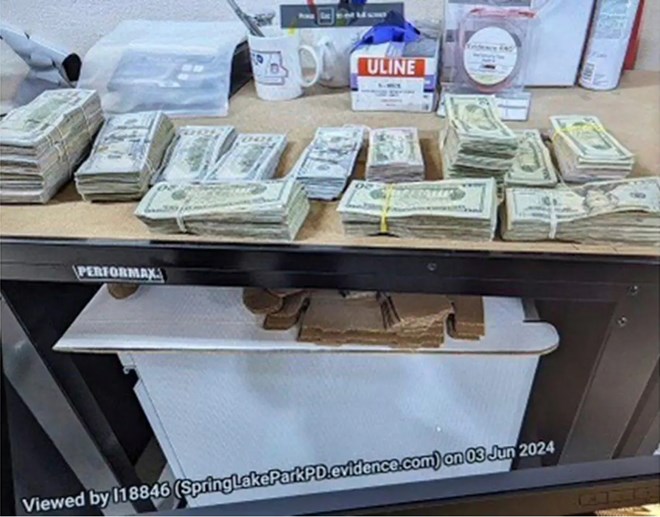
Thursday June 6, 2024

Cash from a bag that was left at the home of a juror in a massive fraud case outside Minneapolis. (U.S. Attorney’s Office for Minnesota/AP)
Minneapolis (HOL) — The FBI raided a residence in Savage, Minnesota, early Wednesday morning as part of an ongoing investigation into an attempted jury bribe in the Feeding Our Future fraud trial. The home, located on Hampshire Lane, was reportedly purchased by one of the trial’s defendants, Abdiaziz Shafii Farah, with money allegedly embezzled from federal meal programs.
The raid comes on the heels of a bribery attempt that shocked the court. On Sunday night, a Somali woman allegedly delivered a gift bag containing $120,000 in cash to the home of one of the jurors. A promise of additional money accompanied the bag if the juror voted “not guilty.” The juror promptly reported the bribe to the authorities, leading to her dismissal from the case. Another juror was dismissed after admitting to hearing about the bribe, prompting U.S. District Judge Nancy Brasel to sequester the remaining jurors and confiscate their cellphones.
Neighbours confirmed seeing FBI agents, some armed with assault weapons, entering and exiting the Savage home with bags. The raid, which took place hours after the jury began deliberations, was connected to Farah, who was accused of being the “ringleader” of the fraud scheme. Farah, co-owner of Empire Cuisine in Shakopee, is alleged to have pocketed $8 million of the $250 million purportedly stolen from the federal meal program.
Federal prosecutor Joe Thompson described Farah as orchestrating a complex fraud operation, which included money laundering, wire fraud, and conspiracy. Farah is also accused of lying on a passport form after the FBI initially seized his passport, with plans to travel to Nairobi, where he was reportedly constructing a 12-story apartment building with the embezzled funds.
The Feeding Our Future case has drawn comparisons to the 1964 jury tampering trial of Jimmy Hoffa, former president of the Teamsters, who was convicted of attempting to bribe a grand jury. Retired Hennepin County Judge Kevin Burke called the current case “baffling,” noting the rarity and complexity of jury tampering cases. Burke sympathized with Judge Brasel, acknowledging the challenges of navigating such unprecedented courtroom issues.
The trial involves seven defendants, including Farah, Mohamed Jama Ismail, Abdimajid Mohamed Nur, Said Shafii Farah, Abdiwahab Maalim Aftin, Mukhtar Mohamed Shariff, and Hayat Mohamed Nur. Collectively, they are accused of stealing over $40 million from a program designed to feed children during the COVID-19 pandemic. Prosecutors allege that the scheme involved producing fake invoices for meals that were never served, operating shell companies, and laundering money.
Assistant U.S. Attorney Joseph Thompson condemned the bribery attempt, stating, “This is completely beyond the pale. This is outrageous behaviour. This is stuff that happens in mob movies.” Defense attorney Andrew Birrell described the accusation as “troubling and upsetting.”
The seven defendants are the first to stand trial among 70 individuals charged in connection with the fraud. Eighteen others have already pleaded guilty, while the rest await trial, including Aimee Bock, founder of Feeding Our Future, who maintains her innocence.
The Feeding Our Future case is part of a broader trend of pandemic-related fraud. An Associated Press analysis last year revealed that fraudsters nationwide potentially stole over $280 billion from federal COVID-19 relief funds, with another $123 billion wasted or misspent. The losses represent about 10% of the $4.3 trillion disbursed by the government. Nearly 3,200 defendants have been charged to date, and about $1.4 billion in stolen aid has been recovered.
Federal authorities continue to investigate the attempted juror bribe, with FBI spokesperson Diana Freedman stating that no additional information can be provided. Those involved in the bribery attempt could face federal charges of bribery of a juror and influencing a juror, carrying a maximum penalty of 15 years in prison.
As the jury deliberates, the courtroom drama unfolds against the backdrop of one of the largest COVID-19-related fraud cases in the country. The outcome of this case could set significant legal precedents and highlight the vulnerabilities in federal aid programs during emergencies.